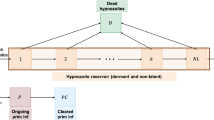Abstract
We consider an open queueing network consisting of servers linked in an arbitrary configuration with exponential service times and separated by intermediate finite buffers. The model allows any number of saturated servers (never starved) and exit servers (never blocked). The considered blocking mechanism is blocking-after-service. In the case of simultaneous blocking, blocked customers enter the destination node on a first-blocked-first-enter basis. If feedback loops exist in the network, deadlocks may arise. We assume that a deadlock is detected and resolved instantaneously by transferring all the blocked customers simultaneously. In this paper, we present an approximation method to analyze this kind of networks. The method decomposes the original network into subsystems. Each subsystem is composed of one or many upstream servers and one downstream server, separated by a finite buffer. The upstream and downstream servers are characterized by exponential service time distributions. Based on the symmetrical approach [2], we develop an algorithm to determine the unknown parameters corresponding to each subsystem. The class of models considered in this paper includes the class of open loss models for feed-forward networks considered by Lee and Pollock [11]. For this class of models, we can show that the system of equations in our algorithm is equivalent to the one used in the algorithm proposed by Lee and Pollock. As a result, our algorithm provides the same results as the algorithm of Lee and Pollock for this class of models. However, it is observed that our algorithm takes less CPU execution time than the one proposed by Lee and Pollock. For the cases of networks with feedback loops, extensive numerical experiments show that the new algorithm, in general, converges very fast and yields accurate results compared with those obtained by simulation as long as deadlocks do not occur too frequently. Moreover, for the merge configuration, we provide the proof of the convergence of the algorithm as well as the existence and uniqueness of the solution by exploiting the properties associated with a symmetric approach.
Similar content being viewed by others
References
T. Altiok and H.G. Perros, Approximate analysis of arbitrary configurations of open queueing networks with blocking, Annals of Oper. Res. 9(1987)481 - 509.
Y. Dallery and Y. Frein, On decomposition methods for tandem queueing networks with blocking, Oper. Res. 41(1993)386 - 399.
Y. Dallery and S.B. Gershwin, Manufacturing flow line aystems: A review of models and analytical results, Queueing Sys. 12(1992)3 - 94.
K.P. Jun and H.G. Perros, Approximate analysis of arbitrary configuration of queueing networks with blocking, in: Proc. 1st International Workshop on Queueing Networks with Blocking, North-Holland, Amsterdam, 1989, pp. 259-280.
L. Kerbache and J. MacGregor Smith, The generalized expansion method for open finite queueing networks, Eur. J. Oper. Res. 32(1987)448- 461.
D.D. Kouvatsos and S.G. Denazis, Entropy maximized queueing networks with blocking and multiple job classes, Perform. Eval. 17(1993)189 -205.
D.D. Kouvatsos and N.P. Xenios, Maximum entropy analysis of general queueing networks with blocking, in: Proc. 1st International Workshop on Queueing Networks with Blocking, North-Holland, Amsterdam, 1989, pp 281 - 309.
D.D. Kouvatsos and N.P. Xenios, MEM for arbitrary queueing networks with multiple general servers and repetitive-service-blocking, Perform. Eval. 10(1989)169 - 195.
J. Labetoulle and G. Pujolle, Isolation method in a network of queues, IEEE Trans. Soft. Eng. 6(1980)373 - 381.
H.S. Lee, A. Bouhchouch, Y. Dallery and Y. Frein, Performance evaluation of open queueing networks with arbitrary configuration and finite buffers, Technical Report, Dept. of Industrial Eng., Kyung Hee Univ., Korea, 1996.
H.S. Lee and S.M. Pollock, Approximate analysis of open acyclic exponential queueing networks with blocking, Oper. Res. 38(1990)1123 - 1134.
R.O. Onvural and H.G. Perros, On equivalencies of blocking mechanisms in queueing networks with blocking, Oper. Res. Lett. 5(1986)293-297.
H.G. Perros, Queueing Networks with Blocking, Oxford University Press, New York, 1994.
H.G. Perros and P.M. Snyder, A computationally efficient approximation algorithm for analyzing open queueing networks with blocking, Perform. Eval. 9(1989)217 - 224.
Y. Takahashi, H. Miyahara and J. Hasegawa, An approximation method for open restricted queueing networks, Oper. Res. 28(1980)594 - 602.
Rights and permissions
About this article
Cite this article
Lee, H., Bouhchouch, A., Dallery, Y. et al. Performance evaluation of open queueing networks with arbitrary configuration and finite buffers. Annals of Operations Research 79, 181–206 (1998). https://doi.org/10.1023/A:1018918604554
Issue Date:
DOI: https://doi.org/10.1023/A:1018918604554




